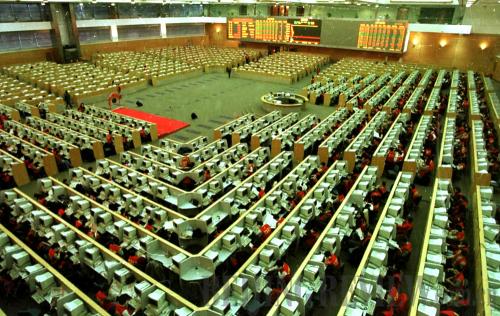|
 |
|
FACING CHALLENGES: Traders work busily in the transaction hall of the Shanghai Stock Exchange. If an international board is launched in Shanghai, the present main board may be hurt (ZHANG MING) |
China is moving closer to launching its own international stock board, a market for foreign companies to list their stocks in China, said Shang Fulin, Chairman of the China Securities Regulatory Commission (CSRC), at the Lujiazui Forum, an annual financial forum, in Shanghai on May 20, 2011.
In April 2009, the State Council published a document clarifying the target, roadmap and key measures to establish Shanghai as an international financial center. Setting up an international stock board, similar to those in New York City and London, is a key component of this strategy.
Since then, anticipation over the international board has been difficult to contain, but the securities supervisor didn't release any specific timetable.
Yuan-denominated
The proposed international stock board will be denominated in yuan, said Tong Daochi, Director of the Department of International Affairs of the CSRC, at the Lujiazui Forum.
Tong's statement settles the dispute on the denominated currency of the shares to be issued on the international board, which is a major issue in the system designing of the board.
At the Fourth Session of the 11th National Committee of the Chinese People's Political Consultative Conference (CPPCC) held in March, He Qiang, a member of the 11th National Committee of the CPPCC and a professor at the Central University of Finance and Economics, suggested the international board be denominated in U.S. dollars.
A U.S. dollar-denominated international board, He said, can set up a "dollar pool" in China, which can alleviate the impact of "hot money" (speculative capital) and the pressure of China's increasing foreign exchange reserves.
However, according to Caixin Century, a Chinese financial magazine, an industrial insider said the international board's designers had reached a consensus that stocks issued in China by foreign companies would not be denominated in U.S. dollars, because that would require approval from many government departments of China and is related to the free convertibility of the yuan under the capital account of international payment, which is unfeasible now.
Also, the supervisor is still drawing up rules for the international board. Tong said related departments have been preparing rules for the international board, including laws and regulations and those meant to address accounting and settlement issues. The current rules are only rough drafts in need of further revisions, he said.
Ready and willing
Foreign companies with deep-rooted operations in China, such as HSBC Holdings Plc., Standard Chartered Plc., Bank of East Asia Co. and General Electric Co., have already expressed their interest in issuing shares on any future international board of the Shanghai Stock Exchange.
Helen Wong, President and CEO of HSBC Bank (China), said at the Lujiazui Forum that the company wants to be one of the first listed companies after the international board is launched.
"We expect the domestic securities market will become more open so that we will have opportunities to list here," Wong said.
Peter Wong, Executive Director of Asia Pacific of HSBC, said his company is ready for a China listing. HSBC has hired Chinese securities companies China International Capital Corp. Ltd. and CITIC Securities Co. Ltd. to help arrange its initial public offering in China when the time comes to finally start selling shares.
International businesses like automaker Mercedes-Benz and private equity giant Blackstone Group have all shown an interest in listing once an international board is up and running.
A double-edged sword
An international board is a necessary step to improving the domestic capital market system, said Huang Tingyi, senior investment consultant of Ping An Securities Co. Ltd. It is also more conducive to providing more channels for investors, resolving investment risks on the A-share market and facilitating connection between the A-share market—China's main board—and the international capital market.
| 